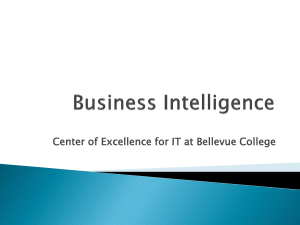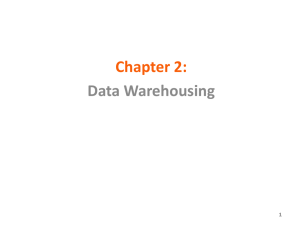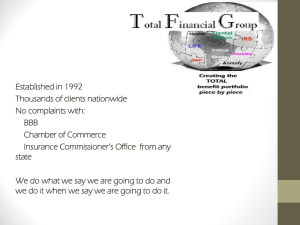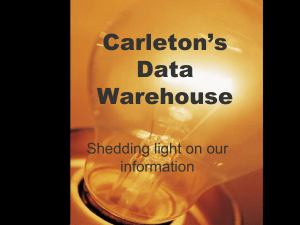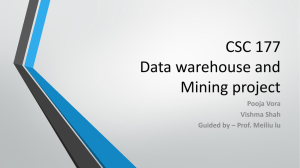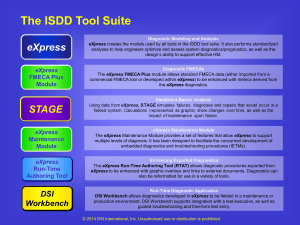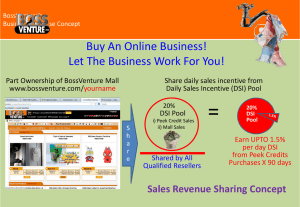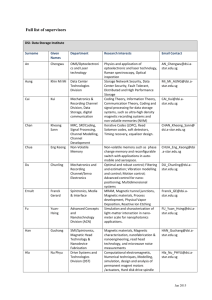(continued) How?
advertisement
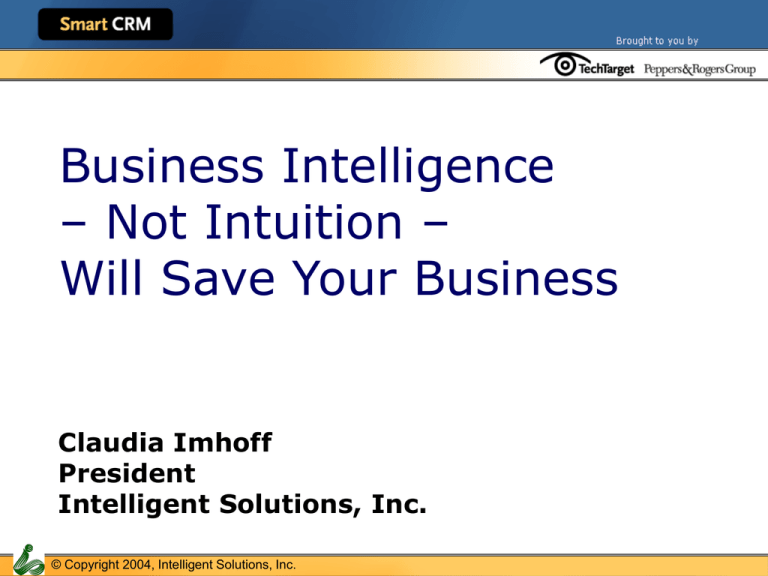
Business Intelligence – Not Intuition – Will Save Your Business Claudia Imhoff President Intelligent Solutions, Inc. © Copyright 2004, Intelligent Solutions, Inc. Topics Business Intelligence • • What it is and how do I get it? What are the benefits I should expect from it? Case Studies Evolution of the Business Community Making Life Simple Business Intelligence An environment in which business users receive data that is: • • • • • Reliable Consistent Understandable Easily manipulated Flexible Business Intelligence (continued) For analyses that yield an overall understanding of: • • • Where the business has been Where it is now Where it will be in the near future How Business Intelligence Helps BI serves two main purposes: • IT monitors the financial and operational health of the organization Reports, alerts, alarms, analysis tools, key performance indicators (KPIs) and dashboards • IT regulates the operation of the organization Two-way integration with operational systems, information feedback analysis BI, without the ability to act on it, is not worth much BI Monitors the Enterprise’s Health As competition intensifies and efficiencies are harder to find, use BI to quickly discern: • Trends in customer profitability, operating expenses, market share and competitors • Patterns in customer purchases, demographic profiles and stores, investments and risk • Relationships among product purchases, suppliers and stores, campaigns and targeted customers BI Regulates a Company’s Operations BI is no longer a luxury – it is essential Decisions are made at lower and lower levels in organizations: • • Everyone is an analyst at some point in the day • They must have access to the results of BI to make appropriate decisions Front-line workers are increasingly responsible for making large decisions Using BI Throughout Your Company Sales and Marketing • Understand customer needs, respond to market opportunities, gauge effects of pricing and promotions, analyze buying behaviors, target customer segments Product Development • Access to critical customer and market data, as well as supplier information, to determine solid costbenefit analyses about features and materials Using BI Throughout Your Company (continued) Operations • A mechanism to analyze quality control, inventory management and production planning performance Customer Service • Accurately assess value of market segments and individual customers plus determine retention strategies for most profitable customers BI Benefits Lowered operating costs • A well-architected environment reduces support from database administrators, analysts and other IT specialists Reduced IT workload • Individuals can perform their own queries and analyses Better access to information – no guesswork • Solid, timely decisions are made Collective knowledge about business drivers • Insight and experience is sharable across the organization A Few Statistics… IDC* studied analytic applications and their impact on core business processes: • • • Marketing campaign Fraud detection Portfolio management What was the ROI for Business Analytics? • • • 46% of organizations generated ROI < 100% 34% generated ROI between 101% and 1,000% 20% generated ROI > 1,000% * “The Financial Impact of Business Analytics,” IDC, www.idc.com/analyticsroi/ A Few Statistics. . . (continued) Value accrued through • Increased business performance to reduced operations to improved customer relations Topics Evolution of Business Intelligence Case Studies Evolution of the Business Community Making Life Simple Topics Wal-Mart – 500% Growth with No Decline Data Warehouse in Production This slide and the following two slides from Greg McMullen – Ford Motor Company 3M Company - A Great 4 Year Stock Chart Data Warehouse in Production FedEx – Impressive 300% Gains 94 95 96 Data Warehouse in Production 97 98 99 00 01 02 Case Study – HSBC Bank, USA* Offers checking, loan, other financial products to customers Goal – maintain high customer acquisition & retention rates, keep operations profitable • • Expand relationships with current customers Keep marketing costs low, move into markets quickly *www.spss.com – success stories Case Study – HSBC Bank, USA* (continued) How? • • Created predictive models to find cross-sells & “rollovers” Focused on best prospects Results • • • Identified specific customer needs – boosted sales by 50% Reduced marketing costs by 30% Increased ability to deploy timely marketing strategies *www.spss.com – success stories Case Study – Ford Motor Company* Global auto maker – 33 million drivers Goal – Ensure high customer satisfaction How? • Mix of reports, trending, segmentation, scoring & life-cycle analyses to support key CRM activities • Predictive modeling to leverage customer understanding, target right customers for > 200 campaigns a year *www.sas.com – success stories Case Study – Ford Motor Company* (continued) Results • • Reluctant to give dollar figures on results but . . . ROI has been reached with large increases in incremental sales *www.sas.com – success stories Case Study – The World Bank* ITs mission – fight poverty with passion & professionalism Goal: To perform quick, insightful analyses on many economic indicators from a hundred countries How - BI environment that • • Allows users to perform complex calculations in seconds in a context and format relevant to individual users Provides trustworthy economic data analyzed on the fly * www.microsoft.com Case Study – The World Bank* (continued) Results • Economists have analytical, collaborative capabilities contributing to improved oversight making governments more accountable • Great variety of skills in users satisfied – heads of state, finance ministers, chief economists, educators, etc. * www.microsoft.com Case Study – Victoria’s Secret* Part of the Limited and Intimate Brands, Inc. Goal • Determine customers likely to respond to targeted marketing campaigns and to help influence behavior *www.sas.com – success stores Case Study – Victoria’s Secret* (continued) How? • Apply analytics to single, customer-centric database giving comprehensive vie of all customer interactions • Identified right customers for specific marketing campaigns that result in multi-channel shopping Results • A potential 400% ROI from pilot test *www.sas.com – success stores Case Study – CompUSA* Largest computer retailer in North America • Their business – helping customers improve their personal and business productivity through technology Goal – Decided to take own advice – improve own productivity • First to recognize a sales trend wins. Translation – know your customer! • Transform data into high value BI * www.microsoft.com Case Study – CompUSA* (continued) How? • Created sophisticated BI environment with low TCO Results • From store floors to corporate HQ – employees put BI to work, see product relationships, marginenhancing capabilities, improved bottom line • ROI - $6 million a year! * www.microsoft.com Topics Evolution of Business Intelligence Case Studies Evolution of the Business Community Making Life Simple Topics Evolution of the Business Community The Business Community has matured • • • • • • Operators Farmers Miners Explorers Tourists EVERYONE! Farmers – Clear Sighted Monitor the effect of decisions on the business by tracking key performance metrics Provide Explorers/Miners with feedback on the effectiveness of their predictions Farmers – Clear Sighted (continued) Demonstrate a fairly predictable pattern of usage • They know what data they want, how they want it displayed, when they want it and in what media See the world in terms of dimensions (time, product, geography) and metrics (usage, counts, revenue, costs) Farmers – Clear Sighted (continued) Farmers predominantly use multidimensional data marts Examples of Farmers • • • • Sales Analysts Financial Analysts Market Campaign Managers Accounting Analysts Data Delivery OLAP Data Mart DSI OLAP Data Mart DSI OLAP Data Mart DSI OLAP Data Mart DSI Explorers - Innovative Endeavor to understand what makes the business work by looking for hidden meanings in corporate data Have little or no idea what to expect from query execution • • An “out of the box” thinker Launches large and often unpredictable queries often receives no results back • Occasionally receives incredible insight Explorers – Innovative (continued) Strive to predict the future based on past results Very knowledgeable about data content within and outside the business Demonstrate an unpredictable pattern of usage See world in terms of data and data relationships Explorers – Innovative (continued) Explorers may start with multidimensional data marts but often require their own environment Exploration Warehouse DSI Exploration Warehouse DSI OLAP Data Mart DSI OLAP Data Mart DSI Examples of Explorers • • • Insurance Actuaries Process Control Engineers Market Research Analysts Data Delivery Miners - Thorough Scan large amounts of detailed data looking for confirmation of a hypothesis or for suspected patterns Have a good idea what to expect prior to query execution Operate on a base of data that is preconditioned for analysis Miners – Thorough (continued) Demonstrate a reasonably predictable pattern of usage Interested in finding meaningful relationships in transactions Miners – Thorough (continued) Miners may start with multidimensional data marts but often require their own environment Examples of Miners • • • • Expert Marketers Risk Controllers Logistics Specialists Statisticians Data Delivery Mining Warehouse DSI Mining Warehouse DSI OLAP Data Mart DSI OLAP Data Mart DSI Tourists - Generalists Have a broad business perspective and are aware of the data produced by the business Use the Corporate Information Factory frequently Cover a breadth of material quickly but in little depth • Are accustomed to a consistent graphical user interface • Need ability to search large banks of data without a lot of typing Tourists – Generalists (continued) Demonstrate unpredictable patterns of usage See the world in terms of business functions Tourists – Generalists (continued) Tourists predominantly use multidimensional data marts and/or informal warehouses Examples of Tourists • • • Executives Managers Casual Users Data Delivery OLAP Data Mart DSI OLAP Data Mart DSI OLAP Data Mart DSI OLAP Data Mart DSI Operators - Focused Use the intelligence derived by Explorers and Farmers to improve business conditions Provide increasing pressure on the Corporate Information Factory in terms of availability, data freshness and query performance • • Need fresh, detailed, day-to-day information Expect transactional performance & response times Operators – Focused (continued) Demonstrate a fairly predictable pattern of usage See the world in terms of process Operators – Focused (continued) Operators predominantly use the operational data store and sometimes multidimensional data marts Operational Data Store Data Delivery TrI Examples of Operators • • • Customer Support Representatives Manufacturing Line Managers Inventory Control Managers Oper Mart TrI Oper Mart TrI OLAP Data Mart DSI OLAP Data Mart DSI Summary There are different BI communities that use the Corporate Information Factory – each using different parts of the architecture: • • • • • Farmers Explorers Miners Tourists Operators Topics Evolution of Business Intelligence Case Studies Evolution of the Business Community Making Life Simple Topics Making Life Simple Start with a solid, proven architecture Simplify the environment • • • • Mask the technological complexity where possible Reduce the complexity of the access tools Remove the barriers to information Remove the clutter The Corporate Information Factory Library & Toolbox Information Workshop Workbench Information Feedback External API ERP API Internet API Legacy API Other Data Delivery DSI Data Mining Warehouse DSI OLAP Data Mart DSI Oper Mart DSI Operational Data Store TrI Operational Systems Systems Management Data Acquisition Data Warehouse CIF Data Management Exploration Warehouse Meta Data Management Data Acquisition Management Operation & Administration Service Management Change Management Corporate Information Factory A well-planned realization of data integration and decision support technologies needed • • Back-end infrastructure for maintenance and sustainability Front-end delivery mechanism for analyses or business intelligence (BI) The CIF is a road map or blueprint • • • For all CRM (and other) systems that support and drive business analytics ensuring coordinated deployment of CRM technologies Demonstrating data flows into and out of technologies as well as their process interactions Mask Technological Complexity Business community should not have to understand the technical architecture to use it • BI tools should match whatever access methods and needs the business community currently has • Appropriate dashboards, portals or other interfaces are then developed according to these needs • The environment must be flexible Obtained by constantly monitoring usage patterns and revamp, revise the interfaces as needed Mask Technological Complexity (continued) Create a workbench based on the workflow for given activities • Bring together appropriate BI and operational capabilities to support each workflow. • The environment must remain flexible! Reduce Access Tool Complexity Don’t use a Cadillac when a Volkswagen Bug will do • Simple user needs require simple interfaces Access tools that can grow in complexity as the need arises, should be chosen • Bring in more capabilities when a definite need is identified • Everyone has Excel . . . Reduce Access Tool Complexity (continued) Don’t assume that one tool will fit all users • You will eventually need at least one tool in each of the major usage categories Query and reporting Multidimensional Data Mining Exploration • BUT – walk before you run! Remove Barriers to Information THINK SIMPLE! • The vast majority of business users have very simple BI requirements IT should study business MBOs KPIs are understood and presented in simple formats Remember – Give IT the support it needs • • • Don’t create a single data mart design to satisfy every possible query – performance suffers Simplify your requirements to just the needed bits – more will come later This simplifies the administration of these capabilities – timely delivery is important Remove the Clutter Present right person with right information, at right time, using right technology • Different analyses require specific technologies, specific data model designs, and specific sets of data Query and reporting Multidimensional analyses Data mining Ad hoc • The business community must be able to choose what data they want from the full offerings available to them Claudia Imhoff Intelligent Solutions, Inc. CImhoff@IntelSols.com (303) 444-6650 www.IntelSols.com
